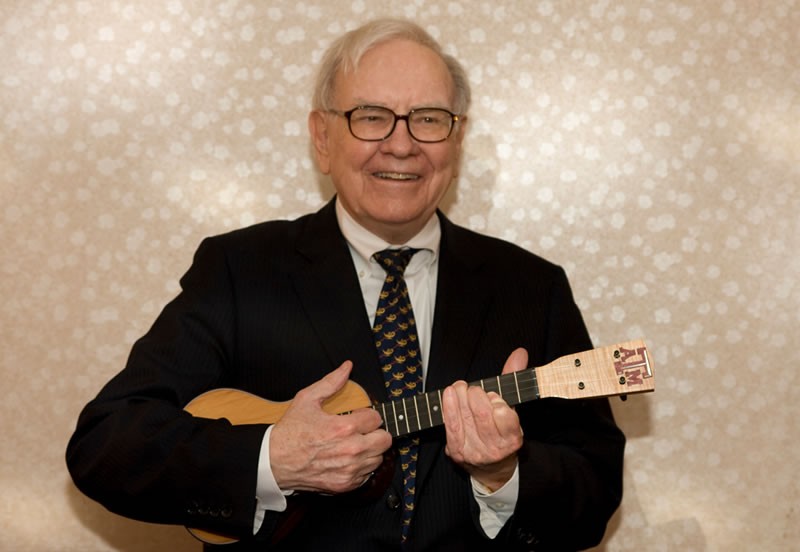Warren Buffett’s wallet 10 investment secrets
Post on: 16 Март, 2015 No Comment

Aug 20, 2014
At a recent charity auction, Warren Buffett‟s wallet won for a bid of US$210,000 because it included a stock tip. Before he sent his 24-year-old wallet to the winning bidder, he removed a significant and personal item that reveals many secrets to his extraordinary wealth building success. In 1969, Warren Buffett was in the process of liquidating his Buffett Partnership and focusing his time and energy on building the holding company that‟s known today as Berkshire
Hathaway. And one of the first businesses he purchased as a wholly owned subsidiary of his new conglomerate was the Illinois National Bank, which was, at the time, the largest bank in Rockford.
Secret 1: Invest in an old economy company thats a leader in an industry you
understand.
Banking may not be the world‟s oldest profession, but it‟s one of the oldest, so a bank is clearly an old economy‟ company. The Illinois National Bank was established in 1931 right in the middle of the Depression by Eugene Abegg, with a beginning net worth of S$250,000 and US$400,000 in deposits. By the time Abegg‟s bank became part of Berkshire, it wasn‟t only the largest in Rockford, it was also one of the most profitable in the country. And since banking is a business that Buffett understands, it was a perfect match for his emerging conglomerate.
Secret 2: Invest in companies with consistent earnings.
In the 38 years before Illinois National Bank became a part of Berkshire, it had registered an 11.7 per cent annual growth in book value and a 15.6 per cent annual growth in time deposits. In its very first year, the bank earned US$8,782, which set the benchmark for the company. Under Abegg‟s management, for nearly 50 years the bank consistently returned two per cent annually on assets. That‟s three times better than the average large bank, so it‟s not surprising that Buffett considered Abegg‟s management to be extraordinary.
Secret 3: Pay only a reasonable price even for an outstanding business.
When Buffett bought Illinois National Bank, he paid US$15.5 million for 98 per cent of the business, not an insignificant amount of money. At the time, though, the bank was earning some US$2 million on US$100 million in deposits, and had a book value of US$17 million. So Buffett bought it at seven times earnings and less than its book value. But Buffett knew exactly what he was doing. Within five and a half years Berkshire was repaid for its investment, and within eight years the bank had paid its parent company $20 million in dividends. Within a decade the bank was worth four times its original purchase price.
Secret 4: Buy a lot of the company, and keep it.
Contrary to popular opinion, Buffett believes in concentration over diversification. Whenever he can, and if he has the money, he will buy all of a company rather than buy pieces of it through the stock market.
Secret 5: Invest in businesses with experienced managers in place.
When Warren Buffett bought Illinois National, Eugene Abegg had been running the business for almost 40 years, and was already 71 years old. Even so, Abegg had every intention of staying on to manage it, and Buffett wouldn‟t have had it any other way. In fact, this is one of the most important elements in the development and success of Buffett‟s empire. Buffett buys companies with successful managers in place, and keeps them in place so they can continue running the businesses as they always have.
Secret 6: Leave talented managers alone to do their jobs and compliment them
from a distance. Just as one might manage a small portfolio of stocks, Buffett manages his wholly owned businesses from afar. He never takes the keys, and never suggests how the companies should be managed. He doesn‟t schedule any meetings with his managers,
and he doesn‟t expect them to submit budgets. He just leaves them alone and lets them do what they do best.
Secret 7: Buy companies from owners who care more about whos buying the
business than how much theyll get for it.
Berkshire doesn‟t have managers in place to run acquired businesses, so it‟s imperative that the founders and managers of the companies it buys stay on after the acquisition. Buffett knows that if the manager cares more about a high sale price and less about the management philosophy of the organisation that‟s acquiring his or her creation, chances are the merger won‟t work. And that‟s because the more a manager is concerned about the purchase price, the less he or she is likely to be concerned about the company‟s employees. This is one of the reasons that Buffett will rarely, if ever, engage in an auction for a business.

Secret 8: Invest in companies whose managers are frugal and care about costs.
Buffett knows that the best way to make more money is to spend less. Our experience, he
wrote in his 1978 letter to shareholders, has been that the manager of an already high-cost
operation frequently is uncommonly resourceful in finding new ways to add to overhead, while the manager of a tightly-run operation usually continues to find additional methods to curtail costs, even when his costs are already well below those of his competitors. No one, he added, has demonstrated this latter ability better than Gene Abegg.
Secret 9: Dont force experienced managers to retire.
Because he knows the value of experience, Buffett has never established a mandatory retirement age at Berkshire. In fact, the opposite policy is in effect founders and managers are encouraged to continue painting their business masterpiece for as long as they have a passion for it.
Secret 10: Above all else, know the character of the manager.
As Buffett says, he acquires managers, like Eugene Abegg, who have every bit of the care
and drive that they would have exhibited had they personally owned 100 per cent of the business. No rules are necessary to enforce or even encourage this attitude; it is embedded in the character of these managers long before selling to Berkshire. Their good character has become Berkshire‟s good fortune.
Acknowledgement: Book of the Investment Club at the University of Gallen.
Supported by MIRABAUD 1819.














